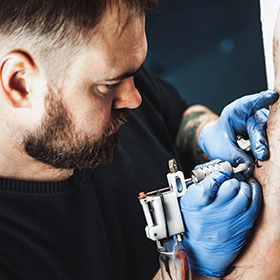No, you should not smoke after getting a tattoo. Smoking can slow down the healing process and increase the risk of infection.
Getting a tattoo is an exciting experience. It’s a form of self-expression and art. However, taking care of your new ink is crucial. Smoking after getting a tattoo can cause complications. The chemicals in cigarettes can hinder your skin’s ability to heal properly.
This could lead to infections or prolonged healing times. It is important to follow aftercare instructions to ensure your tattoo heals beautifully. Understanding the impact of smoking on your tattoo’s healing process can help you make better choices. Read on to learn more about why it’s best to avoid smoking after getting a tattoo and how to care for your new artwork.
Tattoo Healing Process
Smoking after getting a tattoo can slow the healing process. It may cause irritation and increase the risk of infection. Avoid smoking for better tattoo healing.
Initial Healing Stage
After getting a tattoo, your skin needs time to heal. The first stage lasts about a week. During this time, your tattoo may feel sore. It might swell or become red. Keeping the area clean is very important. Avoid touching it with dirty hands. Wear loose clothes to prevent rubbing. Smoking can slow down the healing. It reduces oxygen flow to the skin. This can cause infections. So, it’s best to avoid smoking during the first stage.
Full Recovery Time
Complete healing can take up to a month. For some, it may take longer. Your tattoo needs to be kept clean and moisturized. Avoid direct sunlight and swimming. Smoking during this time can delay healing. It can also affect the appearance of your tattoo. Quitting smoking can help your skin heal faster. It can also improve your overall health. Always follow your tattoo artist’s care instructions. This ensures the best results for your new tattoo.
Effects Of Smoking On Healing
Smoking can weaken your immune system. This makes it harder to fight infections. Your body needs to be strong to heal a tattoo. Smoking takes away this strength.
Healing a tattoo takes time. Smoking makes this process slower. Blood flow is important for healing. Smoking reduces blood flow. Your tattoo may take longer to heal and look good.
Risks Of Smoking After A Tattoo
Smoking can increase the risk of infection. Your tattoo is an open wound. Germs can enter through it. Smoking weakens the immune system. Healing slows down. The tattoo can get infected. Redness and swelling can occur. Worse, pus might form. Infections are serious.
Smoking can cause your tattoo to fade faster. Chemicals in cigarettes harm the skin. The ink loses its brightness. The tattoo may look dull. Nicotine damages skin cells. The tattoo won’t stay sharp. Fading happens quickly. Protect your new tattoo.
How Nicotine Affects Skin
Nicotine narrows blood vessels. This reduces blood flow to your skin. Less blood flow means less oxygen. It slows down healing. Cuts and tattoos take longer to heal. This can lead to infections. Your skin needs good blood flow to stay healthy.
Nicotine makes skin less elastic. It breaks down collagen and elastin. These are the fibers that keep skin firm. Without them, skin sags. Wrinkles appear faster. Tattoos may look distorted over time. Healthy skin keeps tattoos looking sharp.
Alternatives To Smoking
Smoking after getting a tattoo can delay the healing process and increase the risk of infection. Consider alternatives like nicotine patches or gum to avoid complications. Taking care of your new tattoo is essential for proper healing.
Nicotine Patches
Nicotine patches are a good option. They provide a steady dose of nicotine. This helps reduce cravings. You can avoid harmful smoke. Patches are easy to use. Just apply on your skin. Follow the instructions on the pack.
Vaping Considerations
Vaping can be another alternative. It is less harmful than smoking. But, still not completely safe. Some e-liquids have harmful chemicals. Always choose high-quality products. Limit your use to avoid risks. Consult your doctor for advice.
Caring For A New Tattoo
Clean your tattoo with mild soap and water. Pat it dry gently. Do not rub the skin. Rubbing can harm the tattoo. Use clean hands to wash. Dirty hands can cause infection. Clean the tattoo two times a day. Morning and night are good times. Avoid using a washcloth or sponge. These can be too rough. Keep the tattoo clean to help it heal.
Use a thin layer of fragrance-free lotion. Apply it gently. Do not use too much lotion. Too much can clog pores. This can cause problems. Moisturize the tattoo two times a day. Dry skin can delay healing. Keep the tattoo moist but not wet. Wet skin can cause the tattoo to blur. Choose a lotion with natural ingredients. This is kinder to the skin.
Healthy Habits For Tattoo Care
Eating well helps your tattoo heal faster. Your body needs vitamins and minerals. Foods like fruits, vegetables, and lean meats are great. Avoid junk food and sugary drinks. They slow down healing.
Water is vital. Drink plenty each day. Keeps your skin hydrated and healthy. Dry skin can cause problems. Avoid alcohol and caffeine. These drinks dehydrate you. Your tattoo needs moisture to heal well.
When To Seek Medical Advice
Redness and swelling around the tattoo might be normal at first. But if it gets worse, it could be an infection. Watch out for pus or yellow liquid. This means your tattoo is not healing right. Fever or chills are also bad signs. Feeling sick? Your body might be fighting an infection. Seek help fast.
Always trust a doctor if you see any bad signs. They know best. A tattoo artist can help too. They understand the healing process. But only a doctor can give medicine. Don’t wait. Quick action is key.
Conclusion
Getting a tattoo is a big decision. Taking care of it is crucial. Smoking can affect healing. It might slow the process or cause issues. Always follow your artist’s advice. Your health and tattoo will benefit. Stay patient and make smart choices.
Your tattoo will thank you.

